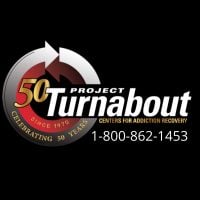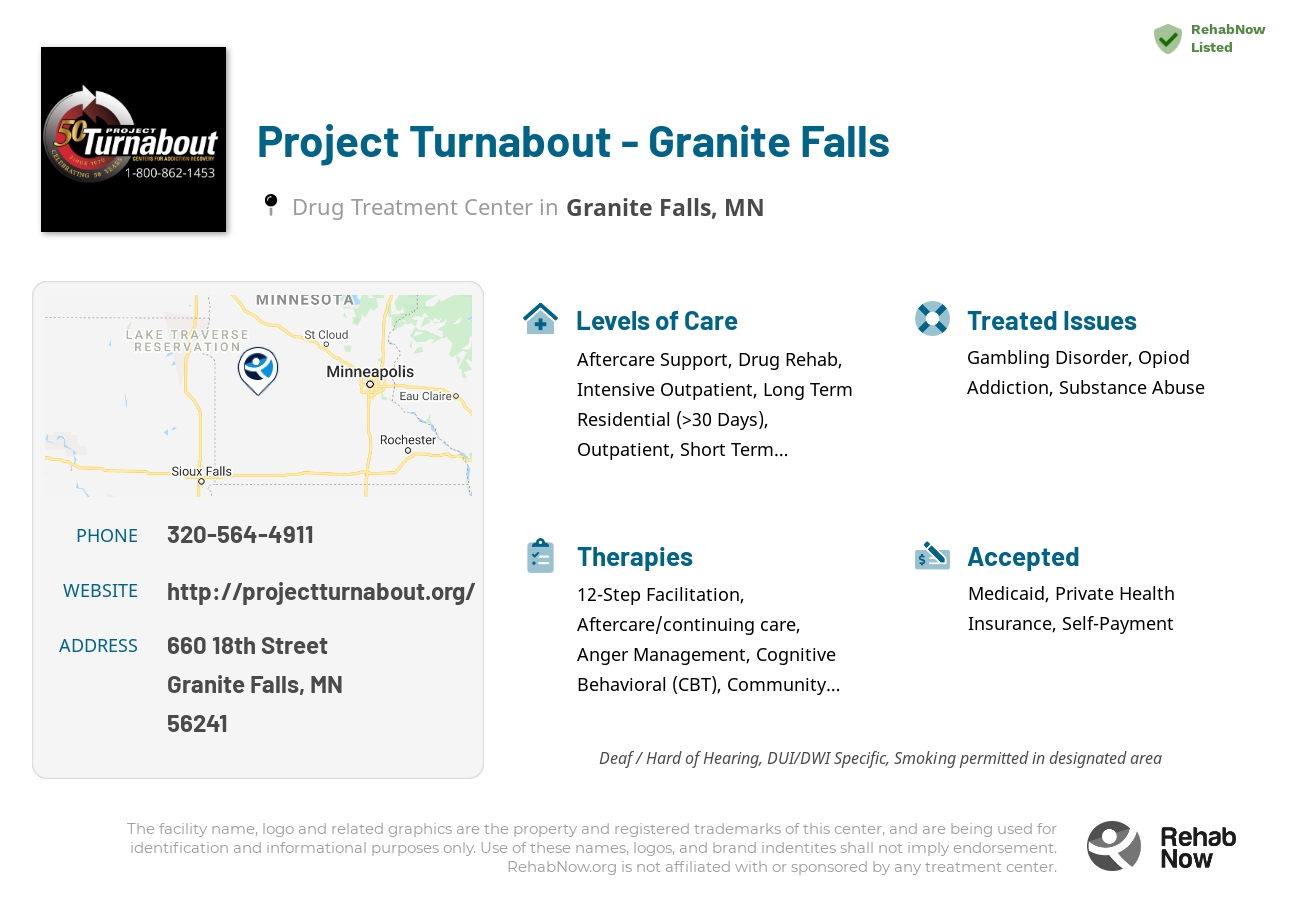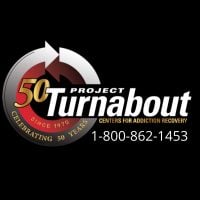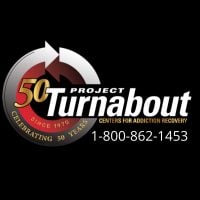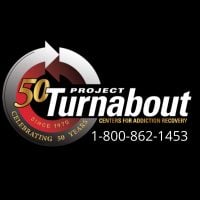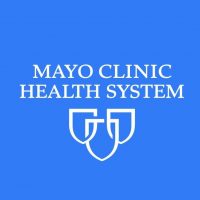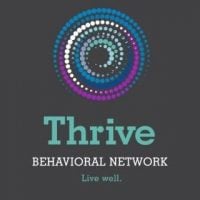Project Turnabout - Granite Falls
Drug Rehab Center in Granite Falls, Minnesota
Project Turnabout - Granite Falls is an accredited, multi-level addiction treatment facility offering medical detox, residential and inpatient care, intensive outpatient and outpatient services to individuals seeking sobriety since 1971; accepted by CARF and NAATP and covered by most private health insurance plans.
About This Granite Falls, MN Facility
Project Turnabout - Granite Falls is an addiction treatment facility located in Granite Falls, Minnesota. Established in 1971, it has a long history of providing effective treatment for individuals suffering from opioid addiction, substance abuse, drug addiction, alcoholism, and dual diagnosis. The center is accredited by CARF (Commission on Accreditation of Rehabilitation Facilities) and is a member of NAATP (National Association of Addiction Treatment Providers), ensuring that it meets the highest standards of quality care. Project Turnabout - Granite Falls is dedicated to helping individuals overcome their addiction and offers a range of levels of care, including detox, residential, inpatient, intensive outpatient, outpatient, and aftercare support. Private health insurance is accepted, making their services accessible to a wider range of individuals seeking treatment and recovery.
Project Turnabout - Granite Falls offers comprehensive and individualized services to address addiction and substance abuse. Their detox program provides a safe and supportive environment for individuals to withdraw from substances while minimizing discomfort and risk. The residential and inpatient programs offer structured and immersive treatment, allowing individuals to focus on their recovery in a therapeutic community setting. The center also provides intensive outpatient and outpatient programs for those who require more flexibility while receiving treatment. Aftercare support is available to help individuals maintain their sobriety and transition back into their daily lives successfully. With their commitment to providing evidence-based treatment and their diverse range of services, Project Turnabout - Granite Falls is dedicated to helping individuals achieve lasting recovery and improved overall well-being.
Genders
Ages
Modality
Additional
Accreditations
NAATP

CARF
The Commission on Accreditation of Rehabilitation Facilities (CARF) is a non-profit organization that specifically accredits rehab organizations. Founded in 1966, CARF's, mission is to help service providers like rehab facilities maintain high standards of care.
Conditions and Issues Treated
Substance abuse refers to the intensive and inappropriate use of psychoactive substances. Psychoactive substances are those that affect brain function. These include illegal drugs, alcohol, and even the excessive use of prescription drugs. The overuse of psychoactive substances leads to severe physical or psychological dependence. It also affects the social life and relationships of the affected individual. Substance abuse is treatable.
The duration of treatment at Project Turnabout - Granite Falls in Granite Falls can require weeks or even months depending on the severity of the condition as there is a risk of relapse. Treatment options include medications, counseling sessions, various types of behavioral therapy, and group therapy in different combinations.
Addiction to prescription opioid painkillers like oxycodone and hydrocodone, and illicit opioids such as heroin, leads to potentially life-threatening withdrawal symptoms when discontinued. Opioid addiction treatment typically involves an inpatient stay at facilities like Project Turnabout - Granite Falls to make sure they get through withdrawal safely. Treatment also includes comprehensive mental health counseling.
Levels of Care Offered
This center offers a variety of custom treatment tailored to individual recovery. Currently available are Aftercare Support, Detox, Drug Rehab, Inpatient, Intensive Outpatient, Outpatient, Residential, with additional therapies available as listed below.
One of the first things an addict should do when entering treatment is to abstain from using illicit drugs completely. Depending on the length of time that the person has been using, the addict may have to go through alcohol or drug withdrawal. Fortunately, detox doesn’t have to be done alone, and withdrawal symptoms can be managed medically in an inpatient or outpatient setting. While detox may be uncomfortable, it is not life-threatening. Detoxification allows the addict to rid the body of all traces of drugs or alcohol and gives the addict a clean slate for their recovery.
Inpatient programs are intensive regimes that require individuals suffering from serious addictions to admit themselves into a controlled environment. Inpatient programs in Minnesota generally span over 28 days to six months. The first step in an inpatient program is medically assisted detox. Doctors and addiction specialists at Project Turnabout - Granite Falls monitor the individual’s vital signs as the drugs leave their system. Some inpatient rehab programs also provide counseling for family members to provide encouragement and emotional support. In inpatient programs, patients have access to 24-hour medical supervision.
Daily trips to the hospital that provides the treatment include intensive outpatient services (IOP). IOP in Minnesota is appropriate for patients in residential recovery facilities that have been diagnosed with addiction. Patients return to their everyday lives gradually, increasing the likeliness of success in treatment.
To assist with alcohol or opioid abuse, or a co-occurring condition, Project Turnabout - Granite Falls offers an outpatient treatment program. For their rehabilitation and other services, the Minnesota patient will go to the treatment center, yet return home every night. After most of the program is completed, the level of mandatory participation reduces.
Residential treatment programs are those that offer housing and meals in addition to substance abuse treatment. Rehab facilities that offer residential treatment allow patients to focus solely on recovery, in an environment totally separate from their lives. Some rehab centers specialize in short-term residential treatment (a few days to a week or two), while others solely provide treatment on a long-term basis (several weeks to months). Some offer both, and tailor treatment to the patient’s individual requirements.
Treatment is just a first step in sustaining sobriety. After rehabilitation, counseling for aftercare helps the person adapt to a life without drugs. A sober living facility in Granite Falls, job therapy, or educational assistance may be included in this service, managed by Project Turnabout - Granite Falls. This is when a preventive strategy for relapse starts to take shape.
Project Turnabout - Granite Falls‘s Therapies & Programs
In addiction recovery at Project Turnabout - Granite Falls, therapy plays a significant role. This helps patients get to the root of their addiction and discover how the problems that contributed to their use can be handled better. Therapy can be performed in a group and one on one settings. The patient interacts with the therapist in a one-on-one atmosphere during individual therapy. This encourages them to reflect on the underlying addiction problems and develop ways to avoid potential future abuse.
Recovering from addiction involves recovering relationships as well. One of the most common areas of stress and damage during addiction is in intimate relationships. Couples therapy at Project Turnabout - Granite Falls can rebuild trust and joy that may have been damaged. Addiction involves everyone in the family, not only the addict.
Family roles can change in damaging ways that may require professional help to rebalance. Successful intimate relationships can decrease the chances for relapse by ensuring a healthy environment after rehab in Granite Falls, MN.
Addiction and alcoholism affect the entire family. For this reason, family therapy is vital to a person’s recovery from addiction. In contrast to couples counseling, family therapy at Project Turnabout - Granite Falls may include siblings, children, parents, and other significant people in the recovering person’s life. Family support is one of the most important pillars of recovery.
Many people turn to drugs and alcohol as a way of processing trauma that has affected them in the past. Trauma can include abuse, neglect, the loss of a loved one and other unpleasant incidents. Trauma therapy at Project Turnabout - Granite Falls helps patients process trauma. It gives them the tools to deal with it in a healthier manner.
Cognitive Behavioral Therapy (CBT) examines the relationship between a patient’s thoughts, feelings and behaviors. Project Turnabout - Granite Falls aims to establish a healthy response to thoughts and feelings as an alternative to turning to drugs and alcohol. It also promotes healthy communication between addicts and those around them. It is and effective therapy for people suffering with all types of addictions.
Rational Emotive Behavior Therapy (REBT) is a type of cognitive therapy. It is based on the principle that irrational thoughts are responsible for the emotional and behavioral changes in addiction. So, the therapy starts with identifying the underlying irrational thoughts. These thoughts are then challenged and opposed logically and then replaced with positive thoughts. It also helps to change unwanted behavior with techniques such as meditation.
By imparting positive thoughts and emotions, Rational Emotive Behavior Therapy (REBT) makes the individual self-reliant with a capacity to handle the emotional and behavioral issues in future by themselves without professional help. This self-dependence benefits the patients and prevent relapses.
Life skills pertain to the skill sets a person should possess to become successful in life. Examples are time management, budgeting, and social abilities. Life skills therapy highlights the fact that addiction recovery is more than just a person’s ability to go through their day-to-day without resorting to substance use in Granite Falls, MN once they leave the facility.
The recovery technique used by Alcoholics Anonymous is the 12 step program, but it can relate to any form of addiction. The 12 steps that addicts must take on the road to recovery are explained. Measures include acknowledging that you have a problem and agreeing to turn around your life. The curriculum, instructed by Project Turnabout - Granite Falls, also requires a belief in a greater power and making amends to others.
It’s no surprise that diet is a crucial player in one’s well-being. What an individual puts into his or her body becomes the fuel that drives the mental and physical faculties to perform accordingly. Therefore, nutrition therapy, also known as medical nutrition therapy (MNT), guarantees that an individual is providing his or her mind and body with proper nourishment.
The right diet can improve a person’s general outlook, sleep habits, and thought processing skills. MNT also lowers the occurrence of chronic diseases such as adult-onset diabetes. Dieticians at Project Turnabout - Granite Falls in Granite Falls, Minnesota believe that nutrition therapy is the key to making significant lifestyle changes, especially when it comes to personal care.Nicotine Replacement Therapy (NRTC) used products like skin patches and gum to deliver nicotine into the bloodstream of people trying to quit smoking. This helps break the habits associated with smoking. The very low doses of nicotine managed by Project Turnabout - Granite Falls prevent cravings while helping people make a gradual transition to complete smoking cessation.
Contingency Management (CM), also called motivational incentives, is a type of pure behavioral therapy. It’s based on the idea that behavior is shaped, motivated, or controlled by its outcomes. CM is a clinical application at Project Turnabout - Granite Falls of operant conditioning, which helps clients eliminate unwanted behaviors by the use of positive and negative reinforcement.
Patient Experience
Fitness Therapy
Fitness therapy is a part of the holistic approach and comprehensive care provided in substance abuse treatment. Fitness therapy in substance abuse treatment includes activities like swimming or jogging that promote movement and improve the general level of fitness of the individual. It does not involve the vigorous exercise regimes used in fitness programs.
Fitness therapy targets attaining the benefits of exercise to the brain like improved attention, cognitive functions, and memory power. Besides, the endorphins released during exercise reduces the anxiety and stress levels and improves the calmness. Fitness therapy complements the various other therapies used in a residential program and outpatient therapies.
Payment Options Accepted
For specific insurance or payment methods please contact us.
Is your insurance accepted?
Ask an expert, call (888) 674-0062
Additional Details
Specifics, location, and helpful extra information.
Granite Falls, Minnesota 56241 Phone Number(320) 564-4911 Meta DetailsUpdated November 25, 2023
Staff Verified
What else do people call Project Turnabout – Granite Falls?
People have occasionally also searched for “Project Turnabout in Minnesota”
Patient Reviews
There are no reviews yet. Be the first one to write one.
Granite Falls, Minnesota Addiction Information
Minnesota is fighting an opioid epidemic that is leaving hundreds of its residents dead each year. Both prescription opioids and illicit opioids are widely abused in the Land of 10,000 Lakes. Heroin continues to be one of the most commonly abused drugs in the state, if not the most common illicit drug. Over 10% of all treatment admissions in Minnesota list heroin as their drug of choice.
Treatment in Nearby Cities
- Fairmont, MN (97.1 mi.)
- Granite Falls, MN (1.0 mi.)
- Windom, MN (68.7 mi.)
- Blaine, MN (116.6 mi.)
- Fergus Falls, MN (104.8 mi.)
Centers near Project Turnabout - Granite Falls
The facility name, logo and brand are the property and registered trademarks of Project Turnabout - Granite Falls, and are being used for identification and informational purposes only. Use of these names, logos and brands shall not imply endorsement. RehabNow.org is not affiliated with or sponsored by Project Turnabout - Granite Falls.
